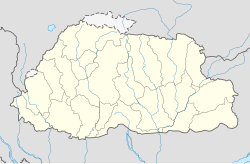Jongkhar
 From Wikipedia - Reading time: 5 min
From Wikipedia - Reading time: 5 min
Jongkhar | |
|---|---|
Town | |
| Coordinates: 26°49′00″N 91°34′00″E / 26.81667°N 91.56667°E | |
| Country | Bhutan |
| District | Samdrup Jongkhar District |
| Population (2017) | |
• Total | 9,325 |
Jongkhar is a small town in southern Bhutan near the border with India, specifically in the Samdrup Jongkhar District. It is situated at an elevation ranging from 200 meters to 3,500 meters, making it the largest urban center in eastern Bhutan. The town is approximately 98.3 kilometers from Guwahati, Assam, and serves as a key gateway for both commerce and travel between Bhutan and India.[1][2]
History
[edit]Jongkhar, historically known as Kothi, evolved as a significant trading hub with the construction of the Samdrup Jongkhar-Tashigang national highway in the 1960s. This development marked its transformation from a small settlement into a bustling border town, crucial for trade between Bhutan and India.[2] The town and its twin, Daranga, across the border, have a rich history of commerce and cultural exchange that dates back to when the Sharchops of Trashigang, Dungsam, Orong, and Trashiyangtse traded goods here.[3] Although insurgency problems post-2003 led to a decline in some trading activities, Jongkhar remains an essential economic center in Bhutan.[1]
Geography
[edit]Jongkhar is located in southeastern Bhutan, sharing borders with the Indian state of Assam. The town's geographical setting includes a mix of lowland and hilly terrains, with altitudes ranging from 200 meters to 3,500 meters.[2] The surrounding region is known for its lush greenery and diverse ecosystems, offering scenic landscapes for visitors and residents alike.[1]
Demographics
[edit]As of 2017, the population of Jongkhar stands at 9,325.[2] The town's demographic composition is largely dominated by the Sharchops, with a significant presence of Lhotshampas in nearby areas such as Bangtar.
Economy
[edit]Jongkhar plays a pivotal role in Bhutan's economy, particularly in the eastern region. The town is a commercial hub where trade, particularly cross-border trade with India, flourishes.[2] One of the key economic activities includes coal mining, which significantly contributes to the local and national economy. The town also boasts a vibrant market scene, offering a variety of goods ranging from traditional Bhutanese handicrafts to fresh produce.[3]
Culture
[edit]The cultural landscape of Jongkhar is a blend of Bhutanese and Indian influences. The town hosts several important religious and cultural sites, including the Zangdopelri Lhakhang, a three-storied temple at the heart of the town, known for its intricate frescos and statues.[2] The town's festivals, markets, and traditional practices offer a glimpse into the rich cultural heritage of the region.[1]
Transport
[edit]Jongkhar is well-connected by road, with the nearest major city being Guwahati in Assam, India, which is about 98.3 kilometers away.[1] The town is accessible via NH 27 and NH 127D from India, making it a convenient entry point into Bhutan for tourists and traders alike.[3] The town also connects the eastern and southern regions of Bhutan, facilitating internal trade and travel.[2]
 KSF
KSF